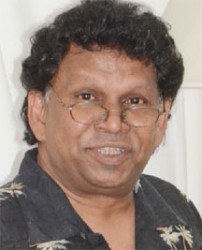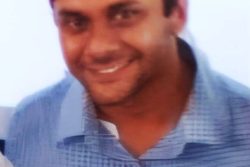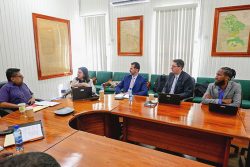Locally-funded publishing house Caribbean Press is facing a serious human resource crisis as its current editor Professor David Dabydeen plans to take a back seat to focus on his own writing and his quest to find suitable candidates to take up the mantle has hit a brick wall.
Dabydeen, responding to emailed questions from Stabroek News, feels that the press would “either die completely or else do the odd book.”
And according to the Professor there is “possibly nobody of competence in Guyana to run the Press” and as a further indictment of local writers he said they are “poor in quality and lazy”.
“Laziness and incompetence,” he continued, adding that he had written a letter published in this newspaper inviting people to join the Press and provided his email address but no one has responded.
“So the Press will either die completely, or else do the odd book: the fate of Kyk Over Al,” he said referring to the pioneering local magazine founded in 1945.
Professor Dabydeen, also Guyana’s Ambassador to China, did not provide answers to all of the questions posed on Caribbean Press but said that he plans to visit Guyana in July when he could be interviewed in detail.
One of the persons he approached in relation to taking on a role at Caribbean Press is local writer Ruel Johnson, who in recent times has been very critical about the operation of the press, and according to Dabydeen he received no response.
Contacted, Johnson confirmed to this newspaper that he was approached by Dabydeen by email and he later outlined what he needed. Johnson was expected to respond by the end of February but he acknowledged that he did not keep that deadline because he got caught up preparing his submission for the Guyana Prize for Literature. He indicated that he would have been making contact with Dabydeen shortly.

According to Dabydeen, he has taken the Press, which was an idea birthed by him during Carifesta X held in Guyana and followed through by former president Bharrat Jagdeo, to a “lift-off position” but he needs to now focus on his own writing. Jagdeo had made available US$100,000 for the launching of the press.
Professor Dabydeen was asked about whether the Press has a policy document governing its publishing decisions and about the general guidelines for selection of works for publishing. He said that he makes those decisions and includes a “few experts”.
“As to editorial decisions I make them, consulting with a few experts: as Professor of Litt and multiple winner of global literary prizes I am fairly qualified to assess literary merit,” Professor Dabydeen stated.
He said that anyone can send him manuscripts for consideration regardless of their age and he does the initial assessing and ten minutes into this process one can normally tell “what is rubbish.
“Policy: only three: quality, quality, quality. In the case of Guyanese based writers, producing mostly dross, we do our best to go for potential quality. Even potential quality is hard to find,” he stated.
Among the issues raised by Johnson earlier this year as he questioned the publication by Caribbean Press of the book by Ashley Anthony, daughter of Minister of Culture, Youth & Sport, Dr Frank Anthony, was the criteria used to publish the book and who made the decision. It was later revealed that the minister had paid the publishing and shipping costs for the publication and Dabydeen had later said that he was so taken by the literary quality of the girl’s work that he accepted it for publication.
Dabydeen was asked whether in the aftermath of the decision to publish Anthony’s novel, writers of the same age range will be able to submit manuscripts for publication and whether aspiring writers can pay for printing and shipping cost to have access to the Caribbean Press label.
However, he said persons cannot pay to be published by the press. If they want to donate they can do so but books are not for sale except for a handful at Austin’s Book Store. He said the majority of books published by the Press are for free distribution to schools and libraries in Guyana.
And about the auditing of the funds provided to the Press, Dabydeen says he controls all monies and he sends the Ministry of Culture a list of books the Press wants to publish (having consulted with experts) with the costs of publishing.
“They either pay or don’t pay. If they pay, fine, I get the money and pay proofreaders, printers etc and get the books done and shipped. I am a contractor, like Courtney Benn or BK, except in books, not concrete!”
He said that the Press has published 60 books in the three years it has been in existence.
In an earlier unpublished email interview Professor Dabydeen had indicated that this year and next year the press plans to focus more on publishing books for children including a specially commissioned textbook for 6-7 year old children. He had said the author of this book would do it for free and the copyright would be with the Ministry of Education. He added that once it proved to be useful the Press would then do books for older children. Further information on this textbook was not forthcoming from Dabydeen in the latest interview.
In the earlier interview Dabydeen had explained that the Press will not profit from its work for a couple of years and this depends on the success of the website, which may attract advertisements in the future. Its website is at www.caribbeanpress.org.
“Very, very, very few Guyanese books have readership outside of Guyana, so it’s a very limited market, especially since we have no intention of publishing pulp/sensational fiction,” he had said in that interview.
He had said his main concern was for the press to continue and to that end, “I intend to fund it myself; if needs be, even if I have to give up the time-consuming business of editing, liaising with printers, designers, shippers etc.”
Meanwhile, Johnson told this newspaper that while he will be interested in an editorial role at the press there is need for a couple of key conditions.
He said the press has to have a functioning independent board of directors that includes government as a stakeholder; a functioning independent editorial board; and has to function under a clearly outlined policy document.
“I believe that the Press has tremendous scope and David [Dabydeen] as the architect meant well when he started it – the problem is that the political intrusion” has affected it,” Johnson said adding that he had indicated his willingness to work with the ministry “because I believe that we are in a unique position to take the lead in the sort of cultural industry initiative that Caricom has been paying lip service to for the past quarter century.”
In a 2010 published interview with this newspaper Professor Dabydeen had stated that the establishment of the Press created a much needed opening for emerging Guyanese writers to have their work published. He had said that the intention was to build the Press into one of the most respected in the world, and consequently the focus had to be on quality,
Back then Dabydeen, who volunteers his services as editor to the Press, had said he was supported as consulting editor of the Press by Dr Ian McDonald, and an editorial board. The editorial board comprised several outstanding Caribbean writers such as Nobel Laureate Derek Walcott, Earl Lovelace and Pauline Melville.
Since then Dabydeen had signalled his intention to continue in his capacity as editor for the next 2 to 3 years after which he would relinquish the editorship to focus on his own literary pursuits.
Caribbean Press has been acclaimed for the publication of the 60 titles since its inception including many in what is referred to as the Guyana Classics series and on the history and culture of British Guiana/Guyana. The works of Edgar Mittelholzer, Wilson Harris, Fred D’Aguiar and Mark McWatt and others have been published. Local launches have been held for these and copies of the books presented to libraries and schools.
Among the list of works to be published are the National Assembly Speeches by former presidents. A statement on the Caribbean Press website said this is an ongoing project, with several more volumes to be prepared for publication on the speeches of Forbes Burnham, Desmond Hoyte, Sam Hinds, Arthur Chung and Bharrat Jagdeo.








